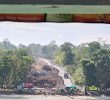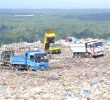DAVAO CITY — An environmental activist from Cebu City has warned about the wanton destruction of the upland watershed areas of Davao City disguised as development, saying this could deplete the city�s supply of clean and fresh water.
�You want to lose water? Put up plantations in your upland watershed areas and kiss your water goodbye,� said Aida Granert of the Cebu-based non-government organization Soil and Water Conservation Foundation Inc.
Granert was here Wednesday for the worldwide observation of Water Day. She shared information on how environmental fighters, government agencies, and other stakeholders in Davao can save the water sources of Davao based on Cebu�s own experiences.
�I was not afraid to drink water straight from my hotel room faucet. In Cebu, you can�t do that without tasting the flavor of our water which is chlorine. You are so lucky here because Davao is still a paradise,� Granert said.
She said people in Davao should realize the importance of protecting the water resources while the city is still enjoying an abundant supply of water.
�You should be very vigilant and work really hard for this fight because this means fighting for your own life. Water is life. Don�t wait for Davao to become the next Cebu,� she told students, academe, media, government officials and environmentalists.
A report made by the Japan International Cooperation Agency (Jica) in 1998, which was also cited by the World Bank�s 2003 Environmental Monitor, indicated that Cebu and Davao would be among the major cities in the country that will face water shortage by the year 2025.
It means that in 2025, Davao would be 45 percent short of the water need while Cebu would be 82 percent short.
For 17 years now, Granert has extensively worked for the protection of Cebu�s watershed and have seen how human irresponsibility and government�s neglect and apathy to the importance of the environment has created a destructive impact on the sources of water.
Some 40 years ago, Granert said, a German environmentalist discovered the salt-water intrusion creeping into the city, a kilometer away from the shoreline.
�Did this discovery worry our significant decision makers? Indifference would best describe their reaction. Not even the slightest �eek� from them. I sometimes wonder if they knew the what salt water intrusion meant at that time,� she added.
As few concerned individuals and groups pushed the issue further, some wells of Cebu were closed.
Cebu is now highly dependent on its aquifers for water. Latest data shows that Cebu gets 18.73 percent of its water from surface water and 81.27 percent from the aquifer. Generally, the country�s queen city is dependent on the Mananga watershed which feeds the aquifer.
She stressed that a protected forest and biodiversity are the primary factors in having a clean and abundant supply of water. In Cebu, she said, only about .08 percent of the mountains remain green.
�The forest is supposed to be the soul of the community. It is supposed to be the soul of the people�it is supposed to be where the source of life starts and if we destroy our forests in favor of temporary development, we are sort of killing ourselves already,� she said.
�We should protect the source of life,� she added.
An estimated 6000 hectares of lands in the upland watershed areas of Davao has been converted to pineapple and banana plantation. The monoculture approach of plantation and their reliance on deadly synthetic chemicals are seen by many as environmentally destructive and dangerous to the health of the people.
And while the Davao City Water District has identified the Panigan-Tamugan Rivers as the future source of drinking water for the city, hundreds of hectares of plantations have proliferated near the said rivers.
�There has been intense debate especially on issue of proliferation and expansion of plantations, devoted to bananas and pineapple among others. There has been continuing discussion on the threat that these heavily pesticide-dependent monoculture farms pose to our upland watershed,� said Lia Jasmin Esquillo of the Interface Development Interventions Inc.
�But common sense would tell us that, since these plantations sit above rivers like the Panigan and Tamugan, these plantation drain down their waste to these vital rivers. This alone should be enough to shaken us and the authorities, that we could be worst than Cebu,� Esquillo said.
The organization has been behind calls for a moratorium in the expansion of banana and pineapple plantations and the banning of aerial spraying of chemicals because of the hazards that the practice pose to the people and the sources of water.
�There should be no letting up in the fight for the protection of our sources of water, the recharged areas and aquifers. There is a looming crisis worldwide and with the increasing population and the increasing demand and the limited water resources we have all the reasons to be concerned,� Esquillo said. �(Jeffrey Tupas/IDIS)










